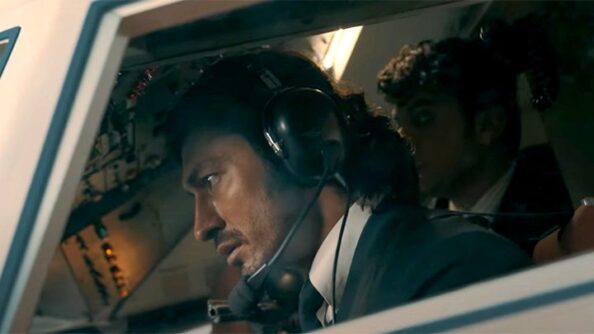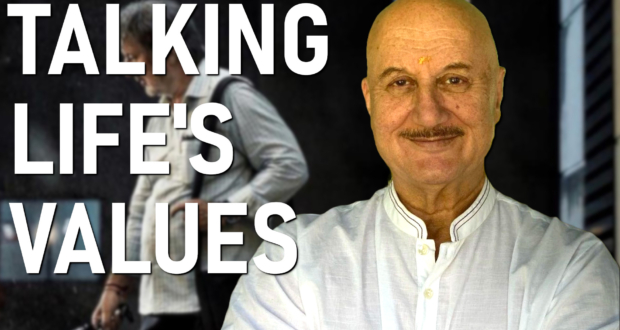American filmmaker David Leitch said, “Spies go undercover. They take on different personas”. To prove this, actor and producer Vidyut Jammwal along with writer and director Sankalp Reddy brought a true espionage incident to the Bollywood big screens on May 12, 2023. Titled “IB 71”, this spy-thriller stars Vidyut Jammwal himself along with Vishal Jethwa, Faizan Khan, and Anupam Kher.
IB 71 (2023): “Vijayi Bhava!” May The Victory Be Yours!
When in 1971, Pakistan planned an air attack on India; it was up to the Indian Intelligence Bureau (IB) to save our country at any cost. Thirty Indian spies disguised as flight passengers deliberately let Pakistani terrorists hijack their aircraft so that they could travel on a secret mission to Pakistan. Check out my narration of IB 71, to see how the Intelligence Bureau (IB) cleverly acted to protect India by preventing the air attack from Pakistan. India’s strategic victory against Pakistan in 1971 will be remembered forever!

IB 71 (2023): Starring Vidyut Jammwal as Intelligence Bureau (IB) agent Dev Jammwal and Vishal Jethwa as terrorist Qasim Qureshi
IB71 (2023) Official Trailer:
The Good:
A True Story Which Was Needed To Be Told!

Anupam Kher as IB Director N.S. Avasti and Vidyut Jammwal as IB agent Dev Jammwal in IB 71 (2023)
Allow me to tell you the real concept behind this true story. In 1971, Pakistan waged war with India and ultimately lost the war. Before 1971, Pakistan was divided into two countries, West Pakistan which is the original Pakistan, and East Pakistan which is now known as Bangladesh. Bangladesh gained independence and became a separate country after India won the 1971 war with Pakistan. In order to travel to East Pakistan (now Bangladesh), the West Pakistanis needed to use India’s airspace because India falls in between the two countries. So, the Pakistanis had planned to launch an air attack on India in 1971 and overpower India so that they can freely use its airspace for transporting weapons and explosives to East Pakistan via airplanes.
India, on the other hand, was unable to block Pakistan’s airspace with its own to prevent the Pakistanis from using the Indian airspace to travel to East Pakistan. It is because, India, if it had done so without any valid reason, could have suffered opposition from international agencies. Therefore, India needed a valid reason to block Pakistan’s airspace. It was then India came up with a plan to send disguised spies in an aircraft named “Ganga” which would be hijacked and later burnt by the Pakistanis. India would take this action as Pakistan’s “act of war” and that would become a valid reason to block Pakistan’s airspace with India. So, I have to say, what a superb plan! Without any violence or bloodshed, India used its brains and fooled Pakistan by conducting espionage. The air attack from Pakistan never happened as its fighter jets got stranded due to blockage of its airspace with India.
IB 71 (2023): Featuring Vidyut Jammwal!
The best thing Bollywood does is to present these real incidents in its films to make us, Indians, aware of how our spies and soldiers had fought against Pakistan to save our country. However, by doing so, Bollywood also raises anti-Pakistani sentiments. These movies are banned in Pakistan. Of course, that’s understood very well!

The hijack scene from IB 71 (2023)
Suspenseful Screenplay!

The screenplay of IB 71 is ultra-thrilling and suspenseful. Vidyut Jammwal, who is renowned for his intense martial art-based action in his movies, has enchanted the audience not with his fist fights but with his brainy and daredevil spy character of Intelligence Bureau (IB) agent Dev Jammwal. The action in IB 71 is low and is nothing compared to the amount of action we are used to seeing in Vidyut’s movies like the Commando and Khuda Haafiz series. Vidyut’s marvelous acting, expressions, and brainwork in this movie have covered up for the lack of action.
The suspense builds up with every passing moment in the screenplay. Every instance, starting from Dev’s mission to rescue an Indian spy from Bangladesh, his spying on terrorist Qasim, and the “Ganga” aircraft’s foolproof hijacking, every bit in this movie is engaging enough to glue you to your seats.

Behind the scenes: Niharica Raizada with Vidyut Jammwal. Niharica plays a spy disguised as the air hostess of the hijacked “Ganga” aircraft
Vishal Jethwa’s acting was superb as well. He fitted into the shoes of the lead antagonist, terrorist Qasim Qureshi, so well that his performance, screen time, and impact in IB 71 can be felt at par with that of Vidyut Jammwal. Anupam Kher as IB Director, N.S. Avasti and Faizan Khan as Qasim’s fellow terrorist Ashfaq Qureshi lent excellent support. Dalip Tahil as Pakistani President Zulfikar Ali Bhutto was funny to watch. The Urdu word “Zulf” signifies “gorgeous long hair” and here Zulfikar Ali Bhutto, as per his name, should have had stylish hair on his head. However, in this movie, Zulfikar Ali Bhutto has been shown as bald. This may have been deliberately done to add humor. Pardon my sarcasm. Pakistani President Zulfikar Ali Bhutto did suffer from male pattern baldness, and that’s what has been shown.
Splendid Cinematography
The credits for the awesome camerawork in IB 71 go to cinematographer Gnana Shekar V.S. The cinematography, visuals, and backgrounds are excellent. In IB 71, we get to see the beautiful and mesmerizing landscapes of Kashmir and of course, the decorative houseboats as well. For decades, Bollywood has shown the Kashmiri houseboats as venues of romance but in IB 71, we get to see Vidyut Jammwal in action in these houseboats. So, IB 71 has altogether diverted the image of the Kashmir houseboats from romance to action!
IB 71 (2023): Behind The Action Scenes In Kashmir With Vidyut Jammwal And Sankalp Reddy!
The Bad:
Not The Spiced-Up Mix That You May Have Desired!

The only disappointing part about this suspenseful spy thriller is that it is not suited for everyone. The Indian crowd, which comprises mainly youth, enjoys those films which are a combo of romance, action, comedy, cheesy dialogue delivery, and thrill. But In IB 71, you will find suspense only, nothing else. There is no romance or humor, and also the dialogues are not too impactful. The lead actress Niharica Raizada plays the air hostess of the hijacked “Ganga” aircraft who is a spy as well. Among all the other Indian spies in this movie, her role is not very prominent.
The Verdict:

The editing of IB 71 is sharp as editor Sandeep Francis has made every effort to maintain a sequential flow of the scenes in this movie which has a run duration of less than 2 hours. With no romance, or comedy, and with minimal action, the film does not deviate even a bit from its thrilling storyline. Every incident has been portrayed in detail as they might have occurred back in 1971 during India’s clash with Pakistan.
And the climax of IB 71 can give you goosebumps when IB agent Dev Jammwal safely brings all the Indian spies back home from their secret mission in Pakistan. The theme “Vijayi Bhava” plays at the end which boosts the feeling of patriotism in the hearts of every Indian citizen.

Real image of the destroyed Indian Airlines Domestic Fokker F27, “Ganga” at Lahore Airport in Pakistan
With IB 71, Vidyut Jammwal has proved that even without intense action, and threatening hair-raising dialogues, he can make a super-duper captivating movie solely by his macho personality, charisma, and expressions! Of course, Vidyut himself is the producer of this spy-thriller and he, along with writer and director Sankalp Reddy, has made us Indians aware of a major espionage incident in the history of the renowned Intelligence Bureau (IB) of India.

Vidyut Jammwal with Vishal Jethwa at the trailer launch of IB 71
On January 30, 1971, the Indian Airlines domestic Fokker F27 named “Ganga” which had Indian spies was hijacked by Kashmiri separatists who were allies of Pakistan. If you ask me, I would say that Vidyut Jammwal and Sankalp Reddy have done remarkable work by shedding light on an unforgettable chapter in Indian history that makes us proud of our Intelligence Bureau (IB). See it to believe it! The screenplay of IB 71 unfolds every bit of the espionage effort that India made during 1971. You may think that incidents like this happen in movies only, but IB 71 is one such movie that will challenge all your imaginations! It showcases a daredevil espionage quest by India that really happened in Pakistan in 1971. Apart from IB 71, other Bollywood movies like Mission Majnu (2023), Ghazi (2017), and Border (1997) also tell the true tales of India’s confrontation with Pakistan during the 1971 war.
Overall, IB 71 is indeed a thrilling ride! The events unfold into unexpected circumstances when the Indian spies reach the Pakistani hotel. The screenplay is bundled with massive twists that are sure to keep you hooked. If you are looking for a thrilling and entertaining movie to watch with your families during weekends, IB 71 is just the one for you!

Celebrating Victory With Vidyut Jammwal’s “IB 71”: India’s Top Secret Mission To Pakistan!
-
Acting - 9.5/10
9.5/10
-
Cinematography/Visual Effects - 9.5/10
9.5/10
-
Plot/Screenplay - 9.5/10
9.5/10
-
Setting/Theme - 9/10
9/10
-
Watchability - 9/10
9/10
-
Rewatchability - 7.5/10
7.5/10






















